The Turkish community and Muslims of Germany are increasingly alarmed after the far-right Alternative for Germany (AfD) roughly doubled its vote share from 2021 and finished second place with nearly 21% in Sunday’s general elections.
“This increase in voter support for far-right parties will stoke xenophobia and raises further risks for Muslims and Turks,” said Salih Yılmaz, the former head of the Union of International Democrats (UID), a nongovernmental European Turkish organization.
Germany’s mainstream conservatives won the country’s national election and the AfD will not be part of the next government but it still has the power to determine the discourse and veto legislation at parliament.
The rise of the far-right can be traced across all Europe, Yılmaz argued, citing similar political developments in Austria, Belgium, France, Italy and the Netherlands.
“But the figures in Germany, frankly, are still not as high as they are in Italy or France, if we must compare,” Yılmaz said.
The AfD was founded in 2013 with the support of Germans who refused to pay for Greece’s sovereign debts in the aftermath of the 2007-2008 financial crisis. The party was seized completely by the far-righter after 2015, notably the peak of the refugee crisis that saw at least 1.3 million migrants from the Middle East seek asylum in Europe.
The AfD’s election gains come largely from eastern Germany.
“A nation that was not seriously cleansed of Nazi ideology under the rule of the Soviet Union, apparently continued this ideology secretly from generation to generation, and now it has somehow emerged through the AfD,” Yılmaz said, pointing out the alarmingly Nazi-like rhetoric AfD employs.
“Recently, the discourse that refugees will drive Westerners out of Europe has started to spread in eastern Germany, and some people have really started to believe it,” Yılmaz said.
He argued anti-immigrant and anti-Muslim sentiment has never disappeared in Germany, particularly institutional racism.
The far-right’s rhetoric is particularly against immigrants, but a distinction should be made that the AfD has no hostility against other immigrants within the European Community, such as Italians, Spaniards, French or Belgians, according to Yılmaz.
“The AfD’s rhetoric is mostly hostility toward the Muslim segment, the Turks,” he said. “They do not hide when they are openly hostile toward Türkiye and the Turks. They have especially gained traction with anti-Islam rhetoric, increased their votes, and they never hide this because that is their most powerful weapon.”
The Turkish community in Germany, one of the largest in Europe with a population of over 3 million people, grew out of small groups of Turkish “guest workers” brought in for rebuilding post-World War II Germany.
Many have welcomed Germany’s decision to pass a dual citizenship law last summer but with a new conservative government, and AfD’s growing power, they fear a reversal in rights they earned over the years.
Lives of many immigrants are difficult already, which is more apparent in rural areas where verbal or physical harassment of Muslims by far-right supporters have increased in recent months, Yılmaz pointed out.
“The AfD is paving the way for this abuse,” he said, adding that he does not think such incidents would significantly increase in metropolitan cities.
“But the anti-Muslim, anti-immigrant sentiment will increase in the coming years. I think it will be even more difficult from now on.”
Yılmaz believes this will naturally affect Turks, the largest immigrant community in Germany.
In the 2000s, those who were hostile to Muslims in Germany were also hostile to Turks, he recalled. “Therefore, the main enemy that the current AfD has declared is Muslims, and it is quite normal for them to be affected by this.”
Germany’s mainstream conservatives led by Friedrich Merz won Germany’s national election. Merz will likely partner with the center-left Social Democrats, who suffered a stinging defeat after their coalition collapsed.
But the results were seen as a rebuke for mainstream parties as the AfD notched its best results ever – and alarmingly, the strongest for a far-right party since World War II.
The campaign was dominated by worries about large-scale migration, with Merz also vowing a tough approach, as well as the yearslong stagnation of Europe’s biggest economy.
The AfD was jubilant on Sunday night, with leaders vowing to become the country’s main party in the next election as its appeal expands. The party has established itself as a significant political force in the 12 years since it was founded, but it hasn’t yet been part of any state or national government.
That’s the result of what is often called a “firewall” against the AfD. Other parties say they won’t work with the AfD, which is under observation by the domestic intelligence agency for suspected right-wing extremism, something the party objects to strongly.
Its branches in three eastern states are designated “proven right-wing extremist” groups, which is particularly sensitive in view of Germany’s Nazi past.
Correction: Feb. 25, 2025
In an earlier version of this article, the former head of the Union of International Democrats (UID) was named as Bülent Bilgi per source Anadolu Agency (AA). The interviewee is Salih Yılmaz.





























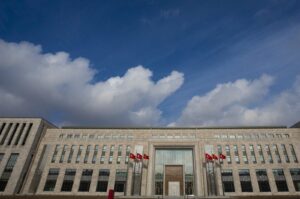


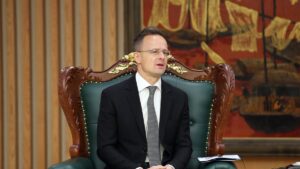
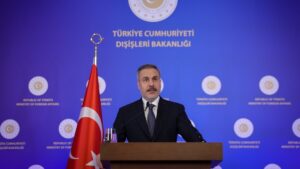





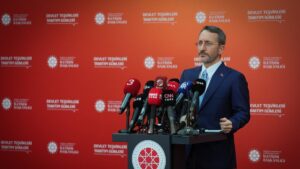





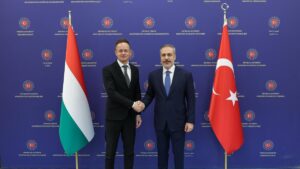



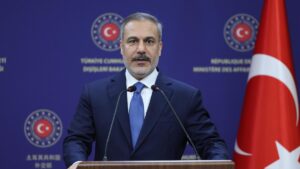
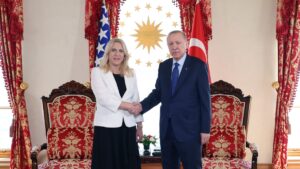
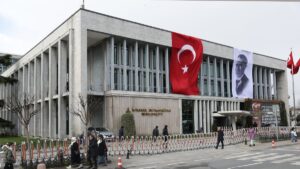
Be First to Comment